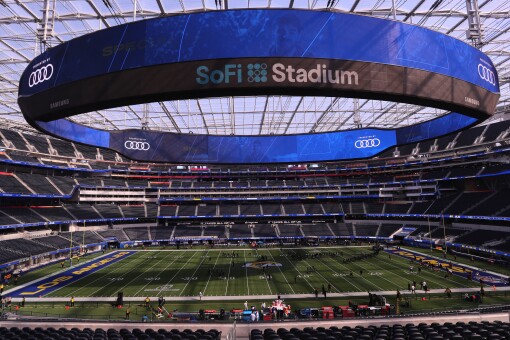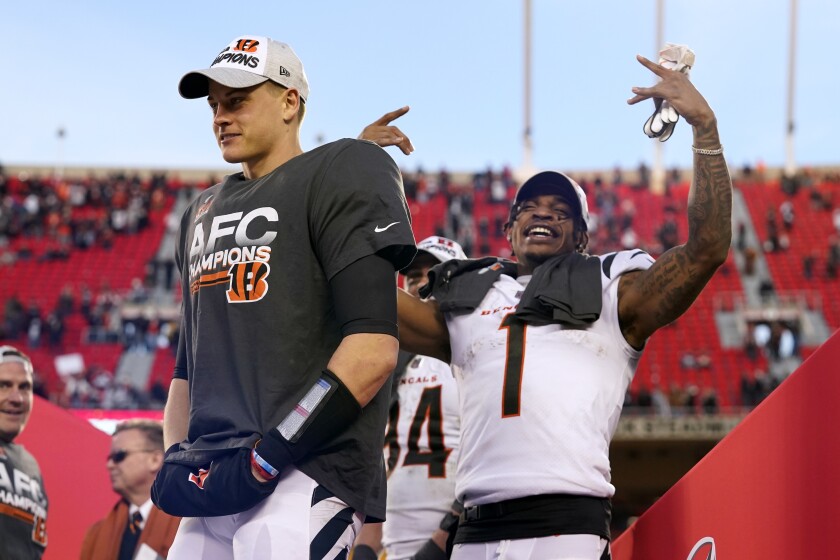Super Bowl strategy: Rams’ primary objective for secondary is to tackle Bengals receivers
Second of a four-part series looking at strategy for Super Bowl LVI. Part 2: How will the Rams handle quarterback Joe Burrow’s three-wideout set of Ja’Marr Chase, Tee Higgins and Tyler Boyd?
With the fifth pick of the 2021 NFL draft, Cincinnati selects …
Back in April, a lot of experts thought the Bengals would go offensive lineman, specifically Penei Sewell.
Instead, they took wide receiver Ja’Marr Chase, bolstering a group that already featured Tee Higgins and Tyler Boyd. Nearly 1,500 receiving yards, 13 touchdowns and a Super Bowl berth later, no one is debating the decision to add Chase any longer.
With Joe Burrow as distributor, Cincinnati finished seventh in the NFL in passing offense and eighth in points during the regular season.

Super Bowl LVI coverage
The Rams were 22nd in yards passing allowed, but only Buffalo’s No. 1-ranked defense surrendered fewer touchdowns through the air.
In attempting to slow Burrow and his three-pronged wide receiver attack, the Rams counter with Jalen Ramsey, one of the league’s most dynamic defensive backs.
Ramsey already has publicly stated his desire to match up with Chase on every snap, saying, “Of course that’s what I’m asking for.”
It isn’t that easy, though. When Ramsey does defend Chase, cornerbacks Darious Williams (5-foot-9, 187 pounds) and David Long Jr. (5-11, 196) will be left to stop Higgins (6-4, 216) and Boyd (6-2, 203).
“I know those guys have played their butts off all year long,” said DeAngelo Hall, a former cornerback who played 14 NFL seasons. “But, because of the size difference, I don’t like any of those dudes in a one-on-one interaction with either of those receivers.”
Now an analyst for the NFL Network, Hall said it’s more likely that Ramsey will take Chase on a situational basis as the Rams mix coverages.
Maurice Jones-Drew, a former NFL running back who now is the analyst on the Rams’ radio broadcasts, said a major factor in attempting to stop the Bengals’ wideouts will be what happens after they have the ball in their hands.
“It’s going to be on the Rams’ DBs to tackle guys in space,” he said. “If they can limit the yards after catch, yards after contact, they’ll have a great chance to win this game.”
In Cincinnati, the argument for drafting an offensive lineman was to help in the development of Burrow. And that is the reason the Bengals instead selected a wide receiver.

Dynamic rookie receiver Ja’Marr Chase (1) is the weapon Joe Burrow (left) needed to help bring the Bengals an AFC championship.
(Eric Gay / Associated Press)
“We needed to be more explosive,” explained coach Zac Taylor, noting that Cincinnati was aiming to replicate something from offensive coordinator Brian Callahan’s past.
Callahan was an assistant with Denver when the Broncos advanced to their two most recent Super Bowls.
The 2013 team featured two 1,000-yard receivers in Demaryius Thomas and Eric Decker, plus Wes Welker, who caught 73 passes.
The 2015 Broncos also had two 1,000-yard receivers in Thomas and Emmanuel Sanders, plus a reliable tight end in Owen Daniels.
What the Bengals want to do is create one-on-one situations for Burrow, giving him the chance to exploit the best option. Taylor said that’s how Peyton Manning and those Denver teams thrived.
“In key moments, playoff games,” he said, “they’d get man coverage and they would pick the one who’s got the best matchup and trust that he was going to win.”
Having three viable wide-receiver options for Burrow, Taylor said, puts pressure on the defense while relieving pressure from the quarterback because the possibilities allow him to get rid of the ball quicker.
Those possibilities will be on display again Sunday, when the Bengals find out if drafting Chase at No. 5 pays its biggest dividend yet.
For all the latest Sports News Click Here
For the latest news and updates, follow us on Google News.
